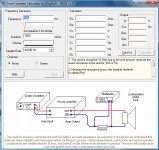SmartSpeakerCalculator for Unknown speakers
This is the software I build today to find the Thiele / Small parameters of unknown speakers. This method is very accurate if it is made in perfect conditions and very precise equipment. It is very useful when you have speaker without parameters and you want to make box for it.
Please post your comments and suggestions. In the next version I'll include Vas calculations.
Enjoy and post your comments.
This is the software I build today to find the Thiele / Small parameters of unknown speakers. This method is very accurate if it is made in perfect conditions and very precise equipment. It is very useful when you have speaker without parameters and you want to make box for it.
Please post your comments and suggestions. In the next version I'll include Vas calculations.
Enjoy and post your comments.
Attachments
Last edited:
Ok So I've measured my 12" Bass using my software and I got Qts of 3,5857 😱
Is this really bad bass?
Is this really bad bass?
Rofl, a Qts of 3 would be bad enough... 0.3 would be decent driver Q, are you trying to say you measured a Q of over three thousand or just over 3? 😀Ok So I've measured my 12" Bass using my software and I got Qts of 3,5857 😱
Is this really bad bass?
You need to operate in a dead quiet environment when testing driver Q, the driver needs to be in free air & suspended vertically as it would be mounted in the front of an enclosure.
I test in virtually the same way, except i don't use a power amplifier, just the function generator output (50 ohm) & the same 1% 10 ohm resistor & multimeter. You need to operate at very low current as well..
Well my speaker was at floor. Could it be the problem?
Can someone measure speaker with this software that has already manufacture Qts and tell the results?
The Q for my speaker was 3 :S not over 3 thousands 😀
Can someone measure speaker with this software that has already manufacture Qts and tell the results?
The Q for my speaker was 3 :S not over 3 thousands 😀
Last edited:
Does you software measure Vas?
It is not measuring Vas for now but I plan to implement that in the new version I am making. 🙂
Perhaps you should credit Rod Elliot's ESP site where you stole your diagrams and method from.
Yes I "stoll" them and?
This diagram is all over the internet. Just search and you'll see. If you have something smart to say then ok if not then... I won't say it here.
Ant this software I gave it for free. I am not selling it.
Last edited:
re:'This diagram is all over the internet' - doesn't mean it isn't copyright, & it doesn't mean that you shouldn't give people their due credit for previous work....
I understand when people get an idea (and give the right credit, like when I did the excel page for the best port/dimension in a system) and that might even take them in a different direction. Meaning that the right track would be developing it into a new idea on their own. There's so many new and different software that nobody did yet come to terms with to develop (like a new software to choose the best driver and that would take only a few hours).
Even though the method is ancient; I think I first saw it in the old Weems speaker book that Radio Shack used to sell; you really need to generate your own diagrams to have any credibility. Just because something is "all over the internet" doesn't mean somebody didn't draw it and still has the copyright on it.
Conrad
Conrad
I like the idea of having a nice little program to calculate the values so I don't have to do it by hand, although I do agree you should put a small reference at the bottom of the program. Although, if you don't know where the original is (as is often the case) you could ask here, for example, as someone obviously knew.
Pity he's gone though, the program would have been useful. I guess I could do some thing in MS Excel, but still...
Pity he's gone though, the program would have been useful. I guess I could do some thing in MS Excel, but still...
Obviously you are young. Well, take advantage of that, change your bad manners (not with me, but for sake of the older more respected people in this forum and everybody else), go on with the needed discussion, and let your nice product mature and be useful in the future. Don't get stuck, yourself, in the entanglement of words or bad habits and definitions. If you give a product for free (or it's use), state that, and take advantage of that, you can be succefull with that. But also understand that your success will be in part in relation to the confidence that most of it's users will deposit in you, on your technical merits and previous learning and discussion.😱It's better for the planet without you.
If the note on the bottom of the software is really important "The need for accuracy" then you must understand that you cannot get accurate data from a single frequency measurement using a multimeter! There are lots and lots of better ways to do the measurements than that.
- Status
- Not open for further replies.
- Home
- Loudspeakers
- Multi-Way
- My software for calculation Thiele/Small for unknown speakers

 rants and raves removed.
rants and raves removed.